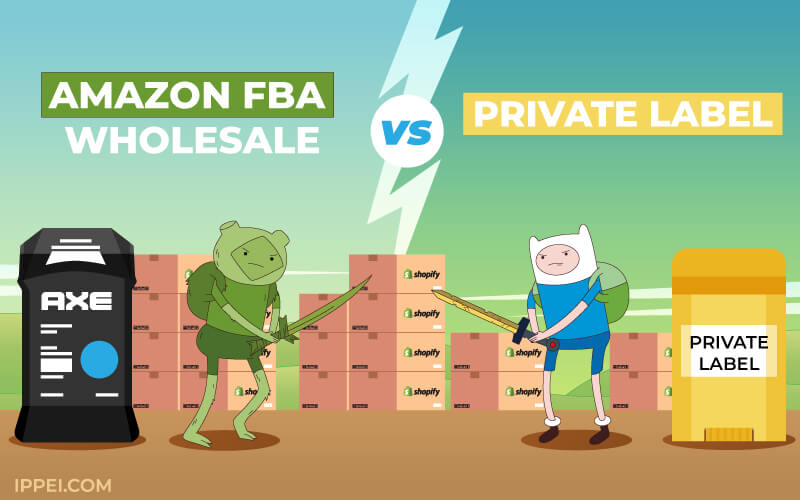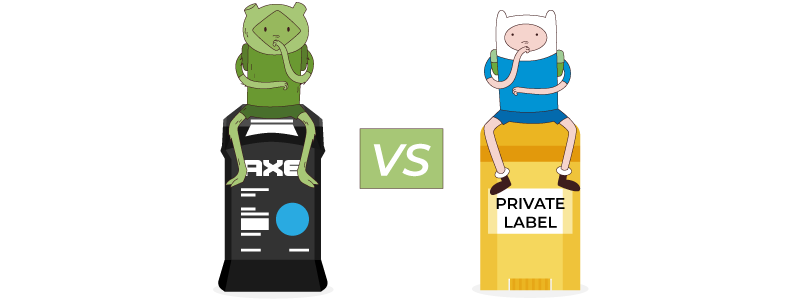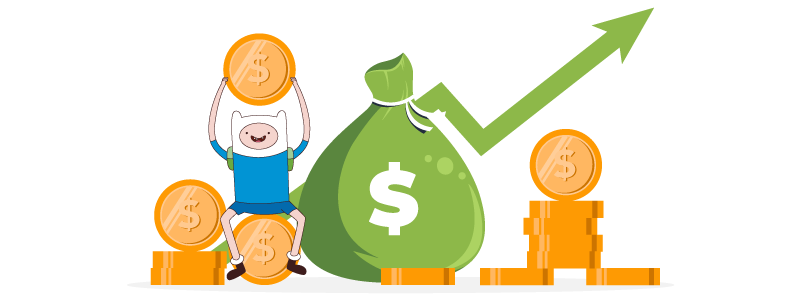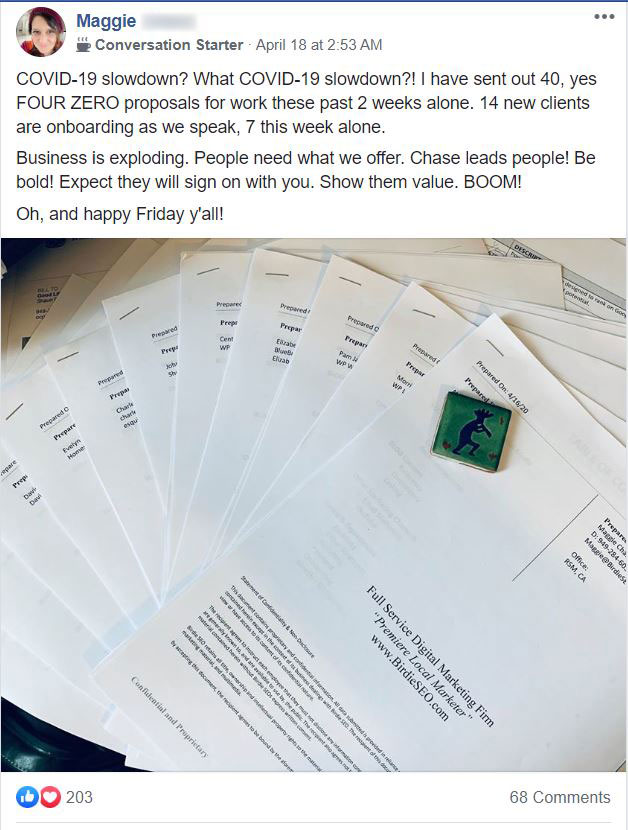
The major difference between Amazon FBA wholesale vs. private label:
The wholesale formula requires the seller to purchase bulk products from recognized brands from a supplier. Then, they repackage smaller bundles or resell single units on Amazon at a higher price.
Amazon FBA private label sellers purchase unbranded product from a manufacturer, place their own brand on the product, and resell it on Amazon at a higher price.
It’s essential that you understand the pros and cons between the two before choosing a business model to follow. That way, you will make an educated decision about which model is best for you.
What is the Difference Between Private Label and Wholesale?

Business Start-Up: Competition and Amazon Product Research
Category
Wholesale
Private Label
Product
Well-established, trusted items.
Generic, unbranded product. Need to order samples from different manufacturers to test for quality.
Brand
Product showcases a known brand.
Seller creates their own brand. More control on increasing perceived value by creating a great brand, packaging & marketing
Time to receive your product
Less: Simply order your bulk product and it will be on its way.
More: Rather than just ordering, you will have to wait for the manufacturer to make your products with the branded label & packaging.
Barcodes
Your product should already have a barcode from the manufacturer.
Seller must find and purchase quality barcodes.
Supply Chain
Little control: If there’s no product at your Amazon FBA wholesale supplier, there’s no product.
More control: If you need more product, simply order more.
Competition
High. Everyone that is selling your product fights for the Amazon Buy Box.
Also high. While a copycat can’t remake your exact product, they can make something very similar. Amazon is an extremely saturated market.
Trademarks
No need to create a trademark.
A trademark is not required, but it will help make your brand profitable and sellable in the future. A trademark costs anywhere from $250-$1000.
Brand Registry
Not needed. The brand you’re selling will already be registered.
Yes, brand registry is available. But you will need a trademark to enroll and unlock its awesome features.
Licensure
Yes. Most brands will want to see that you are a business and hold a sales tax permit before allowing you to sell their product.
No. You do not need a business license to sell private label products, but it helps.
Risk
Medium. There is less risk than private label because your audience knows the brand.
High. The product you branded may never sell simply because you’re unknown.
Managing Your Amazon FBA Wholesale vs. Private Label Business
Category
Wholesale
Private Label
Duplicatable
Very easy to duplicate. In fact, you’re already competing against many other sellers who have the same product.
Also easy to duplicate, unless you have a trademark. or innovate on the product.
Amazon Buy Box
Difficult to win. For your product to appear, you must have the lowest price and be Prime available. This will determine your profit margins, which will fall quickly.
Easier to win. Since you have your own brand and product, you are the only competitor for the Buy Box.
Product listings
No need to create your own product listings, just add your offer to an existing product listing.
Sellers are in charge of creating and optimizing their own product listings.
Product reviews
Reviews will come in with less effort from the seller.
The seller must encourage brand loyalty, purchases, and reviews with high-quality products and responsive customer service.
Search Volume
High. Because the product is already a known brand, organic traffic is more likely to naturally come to you.
Low. Your new brand won’t have a following, so you will need to focus first on ranking your product listing with keyword optimization and PPC campaigns to get reviews.
Advertising
Less, especially if you are selling a very in demand brand.
More. You will need to pay for Amazon PPC (anywhere from $0.02 to $3.00) Also, you will need to create and optimize ads.
Control over business
Less. You have no control over product availability or even the product listing.
More. Because it is your brand, you’re in charge. You can make virtually every decision for your brand. But remember: because you’re selling on Amazon, they have the ultimate say on everything you do.
Scalable
Yes, you can continue to find more distributors / manufacturers that can give you great bulk deals and continue to list more products on Amazon.
Yes. Continue adding more related products to your brand or create new brands. Advantage of building one brand is if it becomes valuable, you can even sell the brand for 3-5x its annual revenue.
Summary: Main Pros and Cons

What are the Main Advantages of Selling on Amazon Private Label?
With Amazon FBA private label, you have more control over business decisions and profit margins. You can also unlock extra product listing features when you register your brand. With private label you have a lot more room to increase the profit margin because you have control over the product look & feel, enhancing the packaging, copywriting on the listing, product inserts, to really increase the value of the product. Above all, there is a possibility of selling your unique brand for big money in the future.
Who it's for: Someone with a creative mind, who can become passionate about becoming great at branding, marketing, and optimizing products, listings, and ads.
What are the Main Advantages of Selling on Amazon Wholesale?
With Amazon FBA wholesale, there is less work involved. You won't have to worry about creating a unique brand or optimizing product listings & ad campaigns. It is also possible to sell product more quickly.
Who it's for: Someone who can contact and negotiate with big brands, manage warehouses, and buy large amounts of product up front. This is more analytical thinking, it all comes down to the numbers and being able to take some risks.
Initial Investment of Amazon Wholesale vs. Private Label
According to Sellersnap, 50% of wholesalers spend less than $2500 to launch. However, for bulk purchases, the more you have to invest, the better deals you will get. Most wholesale experts agree that one should have at least $5000. This investment allows you to conduct quality product research and buy a good amount of stock.
With private label, 66% of private label sellers spend at least $2500. So your initial investment is much higher, sometimes reaching $10K or even $15K. This amount can grow according to:
- The product you choose (take size and weight into account)
- How well you can negotiate with the manufacturer
- Whether you choose to outsource your brand design and sales copy for listings
- Your Amazon PPC ad spend, and how competitive the product category is.
Profit Margin for Amazon Wholesale vs. Private Label

A wholesaler’s profit margin should be around 10%-20%. But, wholesale sellers have little control over this number. Margins will shrink quickly as sellers fight to remain competitive and win the Buy Box.
A private label product may reach a 40% profit margin. No one else is selling their unique product, so the Buy Box competition is low or non-existent. This allows the seller to set a higher sales price and bolster margins, while also remaining competitive with great listing optimization while selling similar products.
How Long Does it Take to Become Profitable per Business Model?
It takes a shorter amount of time for Amazon FBA wholesalers to become profitable. According to JungleScout, 57% of wholesalers turned a profit in their first three months.
It takes private label sellers longer to make a profit. 65% of private label sellers took over 6 months.
Is Wholesale or Private Label More Work?
Wholesale is less work than private label because you won’t need to spend any time creating your own brand. On top of creating that brand, a private label seller also must create and optimize both product listings and Amazon PPC ad campaigns.
Remember: if you’re looking for instant passive income, Amazon FBA is not the place you want to be. No matter what Amazon FBA business model you choose, hard work is necessary to become successful.Amazon Wholesale vs. Private Label: What is Better for Amazon Sellers?

The answer is up to every individual business’ assets, goals, and talents. One seller might find that wholesale is the best way for them to make money online. Others might flourish under the private label model.
Each model uses different types of brain.
A wholesaler must be a great communicator, negotiator and great at building & fostering connections with different distributors & manufacturers. Don't be afraid of putting yourself out there in social settings such as going to trade shows to make new connections with suppliers. Your role is more of an Amazon middleman. Also being great at building systems and working with numbers.
A private label person has to have creativity. Always thinking outside of the box to come up with new product innovations or ways to increase the value of existing products and come up with creative ways to convey that higher value through great branding, pictures & copywriting.
Consider each aspect of every business model before choosing where to put your money. Think about your own strengths, and which model you see yourself actually enjoying it.



On a site like Amazon, i would go with the Private Label route. Creating listings on Amazon are easy, but you can differentiate yourself from other sellers who are all selling your competitor's product. Plus you can create a product label design that markets your product for you. I'm willing to bet you'll make more profits with Private Label products than wholesaling something that you already have competition for.